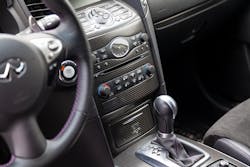Consumers Want, and are Willing to Pay for, Anti-Microbial Coatings in Cars
Anything to help keep surfaces clear of COVID-19 is a hit with consumers. So when it comes to using anti-microbial coatings on high-touch surfaces inside a personal vehicle, including door handles, steering wheels, displays and consoles, they approve.
This is according to a consumer survey conducted by IHS Markit that was conducted actors five major markets. Of the 800 consumers interviewed 54% said they're “very interested” or “interested” in having an anti-microbial coating in their next personal vehicle.
This technology adds specialized polymer coatings to deter viruses such as COVID-19 from remaining on the surface.
While it is not economical to coat entire interior surfaces of a vehicle, IHS Markit expects OEMs and suppliers to deploy cost-effective countermeasures on critical surfaces.
According to the research, the most common surface consumers are interested in anti-microbial applications for are interior door handles followed by the steering wheel, seats, touch screen display, and the center console. Other critical surfaces for anti-microbial coatings include exterior door handles, the gear shifter, and various touchpoints on the instrument panel.
“In an era where paying for additional options are not always welcomed by consumers when buying a new vehicle, nearly half of the respondents indicated they would be willing to pay more than $100 to have an anti-microbial coating,” said Kyle Davis, senior automotive analyst, UI/UX at IHS Markit. “This should signal to OEMs that they can offer these coatings as an optional addition to the vehicle going forward.”
Automakers and suppliers are developing applications for new and existing materials to be used in these applications, though none have been fully determined. Copper and its alloys continue to be the preferred choice since they exhibit natural anti-microbial properties. Recent studies have indicated that COVID-19 was not present on a copper surface four hours after exposure. However, the cost of copper coatings could be rather expensive.
Solutions that do not directly involve anti-microbial coatings are already securing a foothold in the automotive industry. One OEM has developed a solution that heats up the interior of the vehicle to the point that significantly reduces the spread of COVID-19. Another tier-one supplier quickly developed a solution of their own, where an ultraviolet light (UV) can be used to sterilize the interior of the vehicle. This solution does not only apply just for one’s personal vehicle but also shared mobility platforms.
Ridesharing Preferences Also Impacted
Additionally, IHS Markit found that 25% of consumers said that they will not use ridesharing after the COVID-19 pandemic and 80% of consumers expect their rideshare vehicles to have some sort of disinfecting supplies going forward. Nearly half (48%) of respondents said that they will still use ridesharing going forward, but will reduce the frequency in which they were accustomed to before the pandemic.
“While the growing importance of mobility as a service prior to the pandemic was forecast to challenge car ownership norms in the future, the COVID-19 dynamic has emphasized the underlying importance of having a personal vehicle, and consumers are re-thinking their personal transportation needs as they adapt in this new environment,” said Davis.
About the Author
IW Staff
Find contact information for the IndustryWeek staff: Contact IndustryWeek
